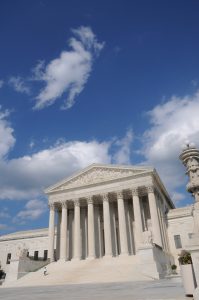By Patent Publius
Earlier this month, the Federal Circuit issued its opinion in Ariosa v. Sequenom, a closely-watched biotechnology case with significant repercussions for patent-eligibility analysis generally. Unfortunately, the Federal Circuit misapplies the Supreme Court’s analytical framework from Mayo v. Read more
 In an important decision handed down today, the Supreme Court explicitly recognized that patents are property secured by the Fifth Amendment Takings Clause. In
In an important decision handed down today, the Supreme Court explicitly recognized that patents are property secured by the Fifth Amendment Takings Clause. In